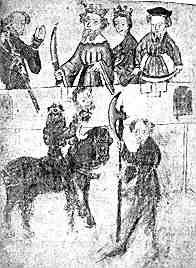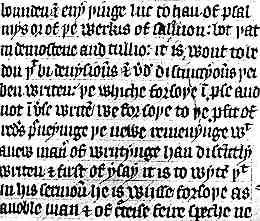





If you are looking at this page without frames, there is more information about medieval writing to be found by going to the home page (framed) or the site map (no frames).
| Literate English (5) | ||
| Like its predecessor, the Middle English of Chaucer's time existed in several distinct regional dialects. Writers of the time recognised three dialects: Northern, Midlands and Southern. Modern linguists ferret out finer distinctions, and if we could include all the local variants that never got written down, the variants might be multitudinous. The problem was, the differences between the major groups were in some cases so great as to make them mutually unintelligible. Not only were there differences of pronunciation, some common words were completely different. | ||
| Information on 14th century English can be found on Harvard University's The Geoffrey Chaucer Website. | ||
 |
The influential southerners like Chaucer made the Southern dialect, especially as used around London, the standard for literary writing and the basis for the development of modern written English. Other dialects do appear in manuscript form. The single manuscript containing the poems Sir Gawain and the Green Knight and Pearl was written in the Midland dialect, for example. | |
| Image of the green knight waving his decapitated head around in the original manuscript in the British Library. | ||
| The medieval writers of Latin had at their disposal an array of formal aids to correct writing: dictionaries, grammar books and volumes of the Latin Classics to use as exemplars. These were part of the earliest apparatus of the Christian church. No such formal texts existed for English. Even into the 15th century, when English was widely written for a range of purposes, spelling was a wild and woolly process based on a rough interpretation of phonetics, and with the various dialects and accents about, that made it extremely approximate. | ||
 |
||
| A segment of the Brut with continuations, from the early 15th century (British Library, add. ms. 33242, f.141). By permission of the British Library. | ||
| The above example describes events in the reign of Edward III, when he set out to disese and stroble the rebell of frannce. Well, you can get the drift of that. This text appears in various manuscripts, and there is a printed edition, derived from manuscripts other than this one, in the Early English Text Society series. Some of the words are rendered quite differently in that edited edition and this manuscript, and it took a fair bit of pondering over both versions to make any sense of some of it. One got a serious impression that there were some journeyman scribes out there who really didn't understand too much of what they were copying in English. | ||
| This section appears in Brie, F.W.D. (ed.) 1908 The Brut, Part II Early English Text Society, Original Series 136, London. | ||
| While literary authors produced one branch of the literate vernacular, another developed in the bureaucracy. The Chancery had its beginning as part of the king's Household, trailing about the country with the court. By the beginning of the 15th century, it had evolved into a hierarchical and stable bureaucracy with fixed places of abode at Westminster and in a house in London in what is now called Chancery Lane, where the Public Record Office used to be before the 21st century caught up with it. From around 1420 there was an increasing use of English, rather than French, as the official language for many chancery documents. | ||
 |
||
| This is the left hand end of a long narrow petition of 1445 in English to Henry VI from the abbess of Barking (London, National Archives E.28/74/51). By permission of the National Archives. | ||
| The above sample from a petition is written in a small and neat chancery hand as, although it is inward correspondence to the Chancery, it would have been written by the Chancery clerks. | ||
| The Chancery had developed its own standards in relation to form of documents, language, linguistic form and spelling which produced a partially standardised written language that was something of an amalgam of the regional dialects. This Chancery English is fairly comprehensible to us as many of its forms have been absorbed into modern English. Such famous London literary figures as Chaucer, Gower and Hoccleve were closely involved with Chancery, and the style leaked into their written English. | ||
| A fascinatingly detailed article on the subject is John H. Fisher 1977 "Chancery and the Emergence of Standard Written English in the Fifteenth Century" Speculum 52, no.4, pp.870-899. | ||
 |
Another standardising influence on written English was the prolific production of Wycliffite Bibles and texts, which spread the language of their centre of production in the central Midlands around the country. | |
| Sample from a Wycliffite Bible from before 1397 (British Library, Egerton 617, 618). (From Thompson 1912) | ||
 |
||
| This fascinating grablet comes from a mid 15th century paraphrase into English from Latin of the registry of Godstow Nunnery (Bodleian Library, Rawlinson MS B.408, f.13). (From New Palaeographical Society 1910) | ||
| The above example, comes from the prologue to the register in which the writer asserts that women of religion should be excused from reading books in Latin because it is not their mother tongue. While casting doubts upon the capability of nuns to be literate in Latin like their male ecclesiastical counterparts, it also indicates that by this time the native language of the country is considered to be English. The language of this document is elegant and quaint, the spelling is unfamiliar, but the text eminently comprehensible to modern readers. | ||
 |
The final nail in the coffin of written English dialect was the advent of printing. England's first printer, William Caxton, in the late 15th century, complained that Old English looked more like Dutch than English; an interesting comment which I think still has some resonances with certain patterns of northern speech. He also complained that the English language was so variable that the version spoken in one shire could be incomprehensible in another. His choice of the language of London was influential in establishing a standard for the written English language, but dialects did not disappear from the land of England. | |
| William Caxton | ||
| Dictionaries and grammar books produced from the 17th century onwards changed the writing of English from an imitation of speech to a prescriptive process. Old sound recordings, preserved in such places as the British Library, testify to the survival of local dialect speech, as opposed to mere regional accents, into modern times. It wasn't manuscript writing, printing or Fowler's English Usage that killed off the richness and diversity of the English family of languages. It was the BBC. | ||
|
|
||
|
|
||
|
If you are looking at this page without frames, there is more information about medieval writing to be found by going to the home page (framed) or the site map (no frames). |
||